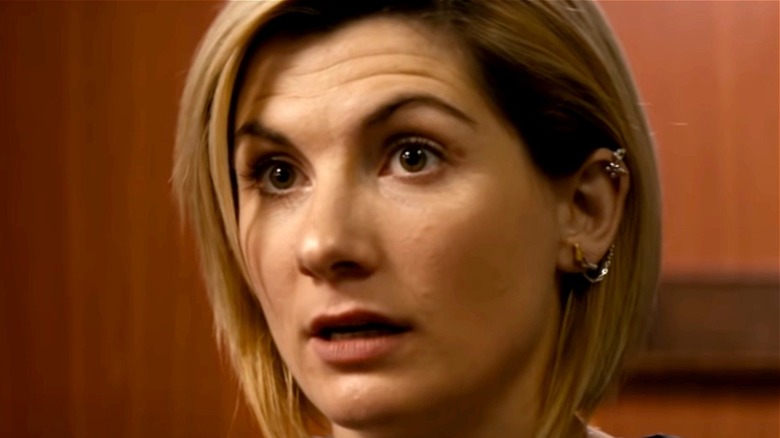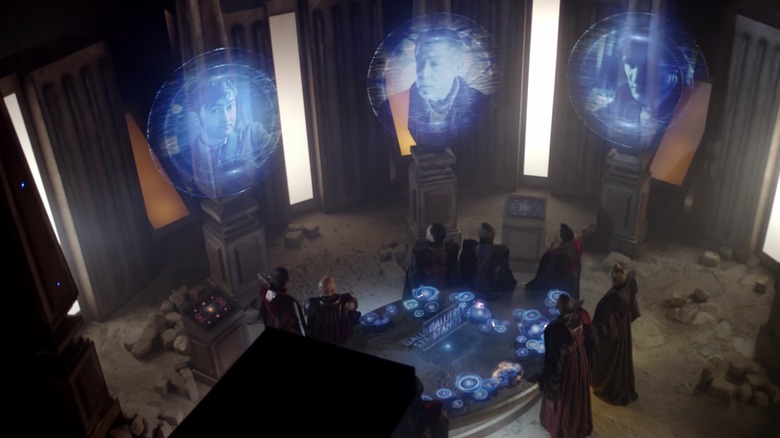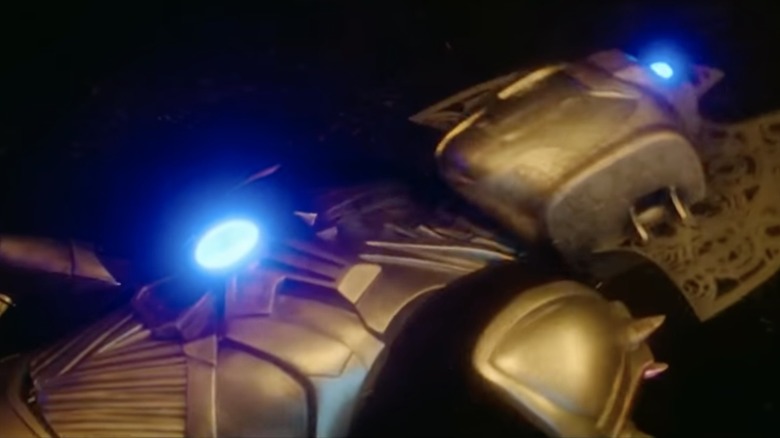The Doctor Who Episode That's Undone By 'The Timeless Children'
One of the most controversial episodes of "Doctor Who" in recent history has been "The Timeless Children." Of course, continuity in "Doctor Who" has always had a fairly tenuous grip on consistency, but that particular episode raised the ire of fans in a major way by ripping up the very foundations of the Doctor character and leaving everything fans thought they knew in shreds.
The episode revealed that the Doctor (Jodie Whittaker) hadn't had just the 13 regenerations (not counting the War Doctor) covered in the series since it began in 1963. In fact, she wasn't even a Time Lord. She was a member of an unnamed race, found and adopted by a Gallifreyan named Tecteun, who soon discovered that her foster child had the power of regeneration. Tecteun became obsessed with discovering the mechanism for that regeneration, and eventually her work became the driver of Time Lord culture.
Showrunner Chris Chibnall did more than give the Doctor a totally different origin story, though, in that one-hour segment. Some critics, like the ones at Den of Geek, argue that in what it called the "fully grimdark finale" to the 12th season, the hero of almost 60 years of British sci-fi became a genocidal maniac, negating a favorite previous episode of "Doctor Who."
In the Day of the Doctor, the Time Lords are saved—but lost to a parallel universe
The episode in question is "Day of the Doctor," the 50th anniversary episode that brought together two of the Doctors from the "NuWho" series, along with John Hurt as the War Doctor. One of the background elements of the Doctor's character in the 2005 reboot is that the Time Lords of old, the Doctor's race, occasionally seen in the classic series, were all killed in The Last Great Time War against the Daleks. This led the first Doctor of the new series (ninth overall), played by Christopher Eccleston, to have a darker, more haunted personality than the previous Doctors. His later incarnations, played by David Tennant and Matt Smith, were also affected.
In "The Day of the Doctor," though, the Doctors figure out exactly how to change things so that the millions of lives on Gallifrey are saved — but lost — during that fateful original battle. As John Hurt's War Doctor explains to the Time Lords while the Doctors outline their plan, the entire planet would instead be frozen in "a single moment in time held in a parallel pocket universe." When the Time Lord named the General (Ken Bones) protests, "We would have nothing," the 11th Doctor (Matt Smith) replies, "You would have hope."
Later events, such as a conversation with The Curator (Tom Bake), indicate that the Doctor's plan worked. Viewers are left believing that the Doctor's next task is to locate Gallifrey and restore the planet to normal space.
In The Timeless Children, the Time Lords become Cybermen and are destroyed
The "Day of the Doctor" was considered a high note for the series, restoring the glory of the Time Lords with an optimistic ending that involved the calculations of all the existing canon Doctors to that point. Unfortunately, the Time Lords are doomed anyway.
In the 12th season episode "Spyfall, Part 2," the Master (Sacha Dhawan) reveals that he has destroyed Gallifrey. Then, in that season's finale "The Timeless Children," he takes the Cyberium into himself and turns the bodies of the dead Time Lords into Cybermen. This makes them Cybermen that can regenerate forever, controlled by the Master. The Doctor eventually uses the Death Particle, which can destroy all organic life on a planet, to consume all the bodies of the Gallifreyans that have been turned into the deadly machines, though she is unable do it herself, so the warrior Ko Sharmus (Ian McEhinney) ends up sacrificing himself to do so.
It's a sobering conclusion to the "hope" that "The Day of the Doctor" left viewers with. And as Den of Geek points out, it's not the first time "Doctor Who" has negated an uplifting conclusion — think the Fifth Doctor's (Peter Davison) final episode, "Caves of Androzani," in which he dies to save Peri (Nicola Bryant) versus the Sixth Doctor's (Colin Baker) first adventure "The Twin Dilemma," in which he tries to strangle her instead — but it may be on the largest scale. Those poor Time Lords just can't get a break.


